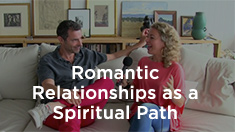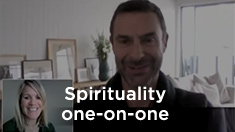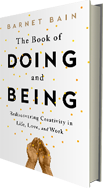Conversation with Barbara Marx Hubbard
Barbara: It’s miraculous. And then “Supra-sex,” of course, is the fourth “S” here.
So this gives us – this is a phrase from Joseph Chilton here that I really love. If you are practicing all of this personal work, and then the “Four S’s” in the way you co-create; Syntony, Synergy, Synchronicity, and Supra-sex, if you have a sense of divine calling, or expression, or life purpose, here’s what he says: “Unconflicted behavior with passionate intent changes the ontological structure of the universe.”
“Unconflicted behavior.” That means a passionate yes to whatever it is. Combined – “Unconflicted behavior” – combined with focused – what is it – with positive intention – changes the structure, the ontological – the way the universe is -this goes to Quantum Physics – that when we have unconflicted behavior with passionate intent the field is responding to that intent. And he did this in The Cosmic Egg, Joseph Chilton Pearce did, he could do the most amazing things. Like sitting at a computer and writing something else and thinking something else that you really couldn’t do, because he had unconflicted behavior with passionate intent, that’s the word.
So, as we’re in the chrysalis, decoding and recoding, the more that we can find this unconflicted behavior joining in co-creative resonant fields, that this is the way the butterfly is being created.
Barnet: Beautiful.
Barbara: We’re doing it right now. Do you want to add to that so that we can then open it up? I said that–
Barnet: I will add very briefly, you had “Four S’s,” I have “Four L’s.”
Barbara: Okay.
Barnet: Live at your edge.
Barbara: Live at your edge.
Barnet: Do not play it safe. Live at the edge of your capacities. And peak.
Barbara: Okay.
Barnet: I am diligent, diligent about being at my level of discomfort. A place where all of the resistances begin to speak to me. So that I see what is there lurking below the waterline that is keeping me from expressing at my fuller amplitude. So, live large.
Barbara: Okay. Live large. I like that.
Barnet: Then, there is loving. You know? Begin to, as we discuss frequently what is it to love? What does it mean to love? Begin to ponder these questions. What does it actually mean? And we had talked about, between us, creating safety for another one, for another. And so it’s doing one’s best to reduce the threat of fear, the threat of humiliation, of abandonment. Not that you need to fix people or yourself, but one does one’s best to reduce the threat of these things, to make another feel, and the self, to feel known, and heard, and seen, and accepted without judgment. And you don’t have to be in agreement. One of the things that has happened in the collapse of imagination and also the collapse of civility and dignity, we don’t even know how to have a conversation. If you look on the pundit shows, everybody is, like, coming from their entrenched positions and–
Barbara: Awful. [Laughs]
Barnet: –there is no dialogue. So we begin to learn to cultivate this sort of Arthurian notion of civility and courtliness, where we’re able to entertain the views of another without getting defensive, and without getting charged and creating a space. So, these are acts of love and pleasuring yourself and others. Making room for pleasure emotionally, and mentally, and spiritually and where appropriate, physically, as well. So we begin to explore, what is it to love?
So what did we cover? Living, we covered loving, learning. Well, everybody on this call is certainly with us–
Barbara: We’re all learning.
Barnet: –in the learning and with being devotedly committed towards love and towards growth. So what is that? Loving, learning, living –
Barbara: That’s perfect.
Barnet: Then leaving. There are times to know when to get off the dance floor. Barbara, you spoke earlier about the going back and looking into your coding. And assessing what – the things that work, you celebrate. The things that don’t work – you bring them up – you cannot leave something that you don’t own. So if you’re going to drop off the keys to the house, you have got to own the house. So you have to bring these things up and acknowledge them, and forgive them in yourself or in another, and release them, and leave them, and move on.
Barbara: And decode. Because –
Barnet: To decode is so critical!
Barbara: Decode – because my big thing was, “I’m a failure.” Now, I don’t know where it came from. I’m a complete failure, I wanted you to know. And so I had–[Laughs]
Barnet: Can we talk about that? [Barbara laughs] Do we know where it came from?
Barbara: My father! [Laughs] Yes. And also the Jewish religious thought —
Barnet: We had separate fathers together. We shared the same father together–!
Barbara: But nonetheless, I decoded that one. Finally. Okay. What we’re going to do now Barnet, thank you so much.
Barnet: there is one more. The last one is laugh.
Barbara: Oh, laugh, okay, okay.
Barnet: We need to laugh. If nothing else, it releases endorphins and wonderful dumps of seratonin, and healthy dopamime. And it’s the best tonic.
Barbara: Okay. So, dear friends, we are now going to have a half hour of dialogue, and see who would like to share with us, to ask a question, to give an inspiration of your own experience but do it succinctly, so as many people as possible can be heard.










